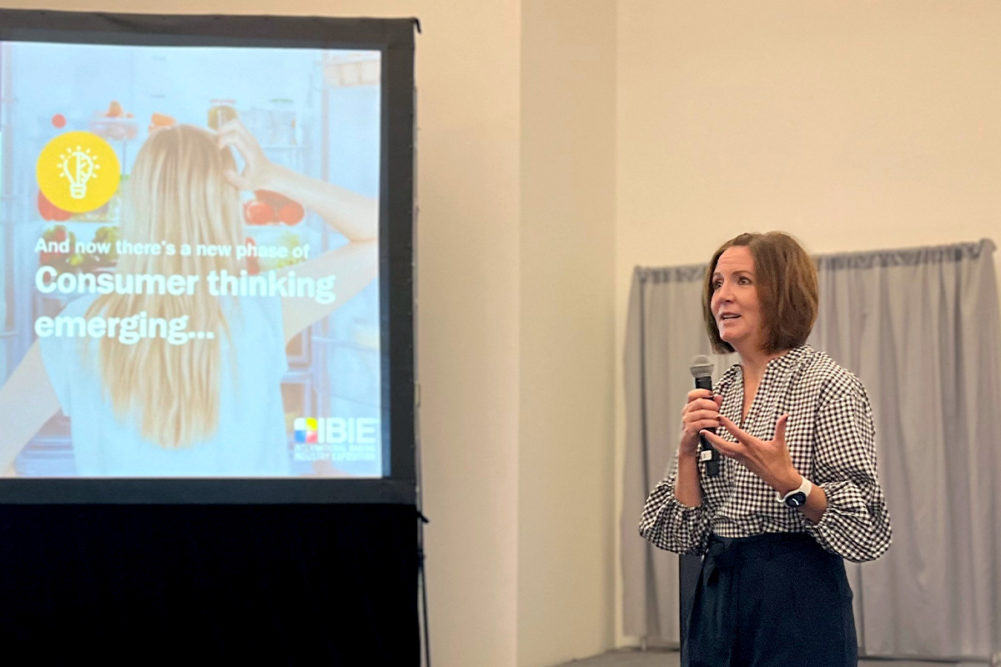Ardent Mills LLC has created a regenerative agriculture program to help farmers prepare for an emerging consumer mindset that prioritizes sustainable food solutions.
“It starts with educating the farmers about the values consumers are looking for in their food supply,” Shrene White, general manager, emerging nutrition at Ardent Mills, said of the program during a Sept. 17 educational session at IBIE, “The sustainability journey: Regenerative agriculture from the consumer to the farm.”
“Consumers are seeking out food products that not only nourish their bodies but actively contribute toward a better food system and practice,” White said.
Proactive buying decisions by the consumer are driving sustainability and regenerative agriculture opportunities throughout the supply chain “all the way back to the farm,” she said.
A sustainability mindset is starting to take shape and move from niche to the mainstream, White said.
“Consumers are learning to navigate the grocery store aisle,” she said. “Fifty percent of consumers are turning their back on non-sustainably sourced products and are now willing to pay more.”
She cited NYU/STERN Center for Sustainable Business findings that sustainability-marketed products account for 16.8% share of market dollars.
If consumers can see that a food company is transparent about its practices, they will be more likely to buy that company’s product, she said.
Consumers are teaching their children to make choices for sustainability, White said.
“The youngest generation is being raised with a new mindset,” she said.
According to Ardent’s research, 4 in 10 consumers believe their own choices about food and beverage purchases can have an impact on the environment and 74% of consumers have a positive perception of food companies/brands that participate in regenerative ag.
In the absence of regulations or industry-wide standards for regenerative ag, Ardent’s program aims to simplify the endeavor for farmers.
“It’s a partnership all the way through the supply chain,” White said.
The regenerative ag program focuses on farming that increases organic matter content, nutrient density and water infiltration. Practices that support these outcomes may include cover crops, increased crop rotations, reducing tillage, rotational grazing and companion cropping.
According to Ardent, the program begins with enrollment. The company offers per-acre incentives to growers who choose to participate. The next step involves measurement and input of data for the crop season to understand sustainability on the farm. Once a baseline is established for a farm, the partnership can move into the phase of making improvement actions, White said.
The lack of clarity around the concept of regenerative ag is driving Ardent’s focus on collecting data.
“All we have now are practices that we recommend,” White said. “The practices differ varying by crop. The next step is emissions.”
Key metrics of the program include land resource efficiency, energy efficiency, climate/greenhouse gas efficiency, water quality index, soil erosion efficiency, soil conditioning index, irrigation use water efficiency and nitrogen use efficiency.
While Ardent pays growers to participate in the regen ag program, there is no quid pro quo, White said. When program members bring their wheat to market, there is no requirement to sell to Ardent.
“We can’t be just transactional,” she said.
Through the regenerative ag program, White said she has been working with many multigenerational farmers.
“They are stewards of the land,” she said. “They work really hard. They want to be able to provide for their families.”
She said Ardent’s program helps growers build diversity on their farms by supporting them through the process of planting a new crop. The Denver-based company is taking steps to protect the water in the Rio Grande aquafer, she added.
“We are coming together as an industry to help growers protect the land through water savings and crop rotations,” White said.
Looking ahead, consumers likely will become more educated and want to know more about what is happening in the food chain, she said.
“It’s coming,” White said about consumer demand for sustainably sourced food. “Are we ready through the supply chain?”
In the short term, participating in the program may be enough, White concluded.



